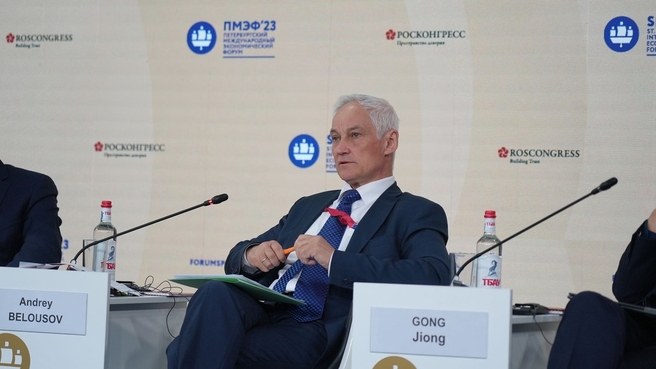First Deputy Prime Minister Andrei Belousov took part in a session of the Valdai International Discussion Club entitled The New World Economy – Not Global, but Interconnected at the St Petersburg International Economic Forum 2023.
During his remarks, Andrei Belousov named key trends in the development of the global economy.
The first trend is the degradation of the globalisation model that emerged in the 1990s after the collapse of the Soviet Union. "Global trade grew twice as fast as the global GDP. It seemed then that it would be like that forever or for a very long time," Andrei Belousov said.
The second is the change in price proportions and the accumulation of debt. "Today it has grown to such a dimension that it has become a problem for central banks in many countries," stressed the First Deputy Prime Minister.
The third is the emergence of super-economies in the global market – new players trying to establish their own world order.
"A super-economy is one that controls more than one or two percent of the global GDP, has control over key resources, and has a technological potential. Over the last 20 years a number of such countries have appeared: India, Brazil and Mexico, while Indonesia, South Africa and Nigeria are also nearly there," Andrei Belousov said.
The fourth is the world's response to climate change. "This has to do with an energy transition with a clear trend to stop the industrialisation of developing countries, as well as the transition to green technologies. Another factor that has not taken off yet, but is clearly predicted, is a food and water crisis," Andrei Belousov noted.
The fifth trend concerns digitalisation and space. According to the First Deputy Prime Minister, a strong economisation of space is underway, which could lead to the creation of a low-orbit space constellation. "This means new technological conditions – the Internet of Things. This is the next wave of digitalisation, which, together with artificial intelligence, creates a new quality of the environment," he said.
According to Andrei Belousov, these trends together will create a qualitatively new situation in the global economy within the next ten years.
"I see two most likely scenarios. The first one is an attempt at a new globalisation, which will be based on digital inequality, on the formation of new alliances against China. These alliances will be based on protectionism rather than liberalism. The second scenario is regionalisation and formation of regional mega-economies around the existing development centres and the new centres that are now being formed. This is not only about China, but also about India. We, too, may have a niche there," Andrei Belousov emphasised.













